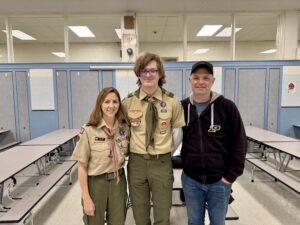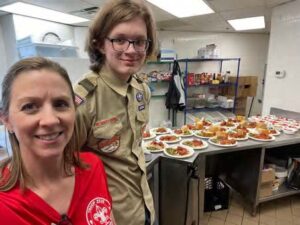
For his Eagle Scout project, Lucas M. from Troop 2535 prepared 100 meals for residents of Alexandria Community Shelter (ACS). With 50 residents at ACS, Lucas provided meals for all of them on two different weekends. These residents depend on food donations, so Lucas said, “This project will show that the community cares about them.”
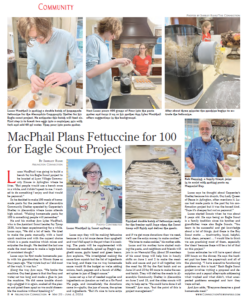 Lucas was originally going to build a bench located at Lyon Village Community House in Arlington, close to his home, but as he said in an article written by Shirley Ruhe about his project plan, “People would use a bench once in a while, and it didn’t speak to me. I wanted to do something I enjoy, and that would be personal.” This led to his decision to make 100 meals of homemade pasta for the residents of the Carpenter Shelter in Alexandria, near his high school. This would eventually change to the ACS, which the Carpenter Shelter runs because the original location had enough donations, whereas ACS didn’t have nearly as many and also allowed people under 18 to serve.
Lucas was originally going to build a bench located at Lyon Village Community House in Arlington, close to his home, but as he said in an article written by Shirley Ruhe about his project plan, “People would use a bench once in a while, and it didn’t speak to me. I wanted to do something I enjoy, and that would be personal.” This led to his decision to make 100 meals of homemade pasta for the residents of the Carpenter Shelter in Alexandria, near his high school. This would eventually change to the ACS, which the Carpenter Shelter runs because the original location had enough donations, whereas ACS didn’t have nearly as many and also allowed people under 18 to serve.
Lucas really enjoys cooking and feeding others. He has made boxed pasta for his confirmation project and homemade pasta with his grandmother. His meals would include homemade Fettuccine and Meatballs topped with spaghetti sauce, with sides of garlic bread and green beans. He created a shopping list of everything he needed, set up a GoFundMe page for $345 in cash donations, made an Amazon Wish List for some of the food and supplies, put up a flyer at his martial arts studio, and shared the links in the Lyon Village email bulletin and with his family. He signed up volunteers online and sent the link to his Troop and a few friends, getting a total of 29 volunteers, ranging from family, friends, Troopmates, and adults.
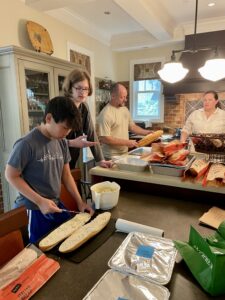 Lucas conducted his project on June 1st and 2nd, the first weekend, and June 14th and 15th, the second weekend. Both weekends were very successful. As Lucas states, “We successfully fed everyone at the shelter who wanted food and there was enough food left over for lunch the next day. I found good prices on bread, butter, and ground beef, so I wound up with extra money for fruit salad for the second weekend. Hungry Root sent us some free kiwi fruit in our family’s meal kits, so I threw that in. People at the shelter were really happy about the fruit, especially the kiwi.”
Lucas conducted his project on June 1st and 2nd, the first weekend, and June 14th and 15th, the second weekend. Both weekends were very successful. As Lucas states, “We successfully fed everyone at the shelter who wanted food and there was enough food left over for lunch the next day. I found good prices on bread, butter, and ground beef, so I wound up with extra money for fruit salad for the second weekend. Hungry Root sent us some free kiwi fruit in our family’s meal kits, so I threw that in. People at the shelter were really happy about the fruit, especially the kiwi.”
Of course, completing a project without a couple of hiccups is very rare. “One group of volunteers didn’t show up for the correct time slot, so it was kind of stressful. Sometimes it was hard to find everyone a job, because a lot of it was just waiting for stuff to cook. On the first weekend, it was hard to cook 50 servings of pasta all at once. The second weekend, I knew what to do.”
Most importantly, Lucas demonstrated immense leadership skills throughout his project. He showed people how to do tasks, like using the pasta machine, making meatballs, and preparing garlic bread. Instead of just telling them to do it, he showed and explained the tasks in detail before assigning them. He even had directions written for volunteers at each station.
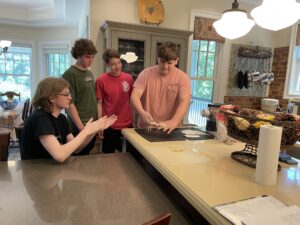
Lastly, when asked, ‘What was the most rewarding about being the leader?’ Lucas said, “With a lot of Eagle projects, you don’t get to see the effect it has. But I got pretty much instant gratification. Most people said thank you. Some people came back and asked for more. I didn’t want to be hailed as a hero, but they gave me a round of applause after dinner. If I had the money and the help, I would do this every two weeks.”
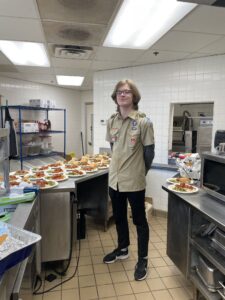 Lucas began his project on April 4, 2024, had his plans featured in an Arlington Connection and The Gazette Packet article in early June, then followed through and completed his project on June 15, 2024, after 132 hours. He completed his Eagle Board of Review on November 19, 2024.
Lucas began his project on April 4, 2024, had his plans featured in an Arlington Connection and The Gazette Packet article in early June, then followed through and completed his project on June 15, 2024, after 132 hours. He completed his Eagle Board of Review on November 19, 2024.
When asked for his advice for other Scouts doing Eagle Projects, Lucas said, “Pick something you know will make a difference and something you will enjoy. You don’t need to do the same things that everyone else does.” Having been diagnosed with Autism Spectrum Disorder (ASD) in September, getting the answer to why he faced certain challenges and why he came up with creative solutions, Lucas feels this advice is especially important for neurodiverse Scouts because it will help them stay motivated as it did for him.
